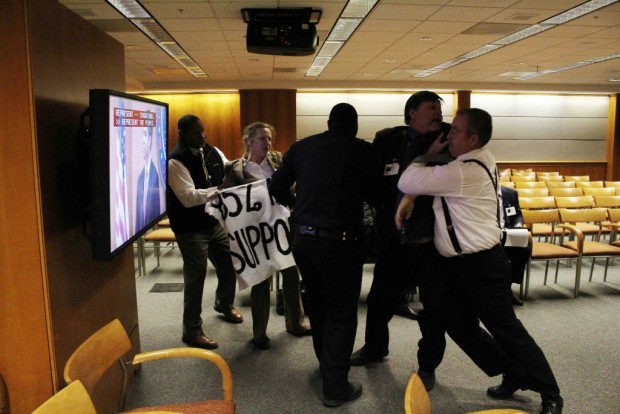
The debate over net neutrality is getting ugly as Republicans make a last ditch attempt at derailing the Federal Communications Commission’s (FCC) plan to regulate the internet as a public utility, like landline telephone service, and make service providers more accountable to consumers.
At a press conference on February 10, Ajit Pai, one of five FCC commissioners, spoke out against the agency’s plan, saying the public is being “misled” about a plan that is “worse than I had imagined.” Pai, a Republican and longtime opponent of net neutrality rules, will be in a 2-3 minority when the Democratic-controlled commission votes on the plan on February 26.
Protesters interrupted the press conference and were removed by security guards as they tried to unfurl a banner reading, “85 percent of Republican voters support net neutrality,” a reference to a University of Delaware poll taken in November 2014.
The protesters, Margaret Flowers and Kevin Zeese of the group Popular Resistance, whose writings on net neutrality and activism are frequently posted on Truthout, said in a statement that they were “body-slammed” and “attacked” for exercising their free speech rights.
“Fear of our message that there is widespread support for net neutrality even among Republicans . . . resulted in the police assaulting us in an attempt to prevent that message from being heard,” Zeese said.
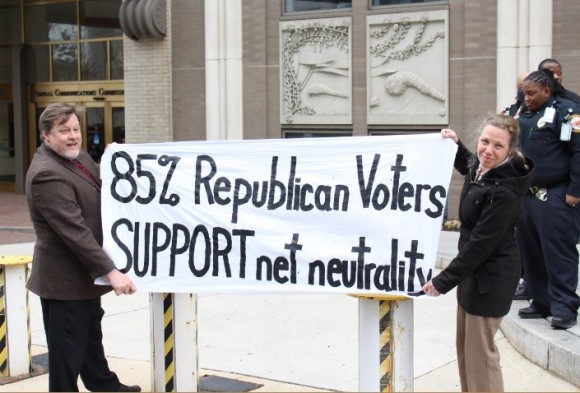 Zeese and Flowers outside the FCC. (Photo: Eleanor Goldfield)
Zeese and Flowers outside the FCC. (Photo: Eleanor Goldfield)
Grassroots activists and consumer advocacy groups have worked to build broad public support for strong net neutrality rules over the past year with organized protests at FCC offices and unprecedented online campaigns that filled the FCC’s inbox with millions of public comments.
Their efforts paid off last week, when FCC Chairman Tom Wheeler circulated a net neutrality proposal that would reclassify the internet as a “common carrier” under Title II of the Communications Act, giving the FCC authority to prevent internet service providers from discriminating against web content and ensure that services, rates and practices are “just and reasonable” for consumers.
GOP lawmakers and the telecom industry have long opposed Title II reclassification and strong regulations in general. Growing public support for net neutrality has put them in a tough political spot, and now they are desperately trying to win back public opinion as the vote on the plan quickly approaches.
“President Obama’s plan gives the broad and unprecedented discretion to micromanage the internet,” Pai said in a statement. “The plan gives a Washington bureaucracy a blank check to decide how internet service providers deploy and manage their networks, from the last mile all the way through the internet backbone.”
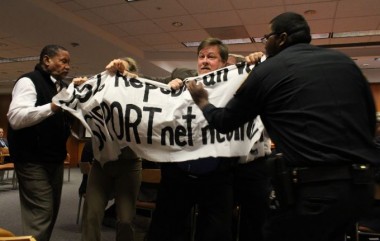 Zeese and Flowers unfurling banner as police attack. (Photo: Eleanor Goldfield)
Zeese and Flowers unfurling banner as police attack. (Photo: Eleanor Goldfield)
Wheeler has promised that the broadband industry would be exempt from seeking government approval for rates and other regulations levied on traditional utilities, but Pai said that is not true because the plan invites consumers and content creators to complain to the FCC about issues like rates. If the FCC found that rates did not meet Title II’s “just and reasonable” standard, the agency could, for the first time, set rates “after the fact.” While Pai may be correct, it’s unclear why allowing the government to tackle unfair pricing schemes would be bad for anyone – except, perhaps, broadband companies.
Pai repeatedly referred to the plan as “President Obama’s plan” instead of Wheeler’s, suggesting that it was the White House – not millions of public comments and months of outspoken activism – that pushed Wheeler to propose tougher net neutrality rules than he originally planned. Obama stayed mum on net neutrality for months as the FCC mulled over less aggressive proposals, but came out in support of Title II reclassification in November and outlined his own vision on what the rules could look like.
Consumer advocates say Pai is insulting the US public’s intelligence. Harold Feld, senior vice president of Public Knowledge, said every president in the past 30 years has weighed in on FCC decisions of national importance.
“It is the worst sort of dismissive and elitist insult to the American people, who have participated in the net neutrality debate in unprecedented numbers and spoken with unmistakable clarity across the political spectrum, to call Chairman Wheeler’s proposal ‘Obama’s plan,'” Feld said.
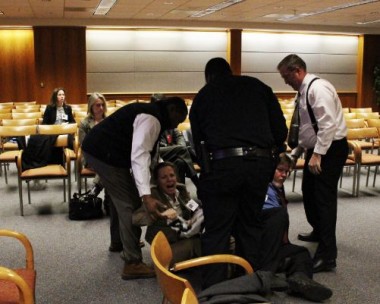 Flowers and Zeese after being shoved to the ground by police. (Photo: Eleanor Goldfield)Pai’s suggestion that the plan was Obama’s idea is being echoed in Congress, where industry-backed net neutrality bills introduced by Republicans are failing to find bipartisan support. Now, Republicans in both houses are demanding that Wheeler disclose details of communications between his agency and the White House.
Flowers and Zeese after being shoved to the ground by police. (Photo: Eleanor Goldfield)Pai’s suggestion that the plan was Obama’s idea is being echoed in Congress, where industry-backed net neutrality bills introduced by Republicans are failing to find bipartisan support. Now, Republicans in both houses are demanding that Wheeler disclose details of communications between his agency and the White House.
The investigations are being led Sen. Ron Johnson (R-Wisconsin) and Rep. Jason Chaffetz (R-Utah), who chair committees on government affairs and oversight, respectively. The FCC is an independent agency, and the lawmakers said they are investigating whether the White House had an improper influence over the draft plan. Johnson also lashed out at Wheeler, calling the decision to reclassify the internet under Title II flat-out “wrong.”
Wheeler, however, has maintained that he made the decision to scrap his original proposal and take the Title II route on his own.
“Originally, I believed that the FCC could assure internet openness through a determination of ‘commercial reasonableness’ under Section 706 of the Telecommunications Act of 1996,” Wheeler wrote recently on Wired.com. “While a recent court decision seemed to draw a roadmap for using this approach, I became concerned that this relatively new concept might, down the road, be interpreted to mean what is reasonable for commercial interests, not consumers.”
The deadlines for complying with both information requests are set just days before the FCC’s vote, giving Republicans a chance to generate some last-minute controversy over what some in the GOP have called “Obamacare for the internet.”
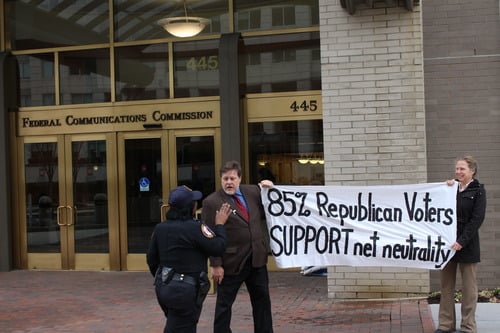 FCC security continued to harass the activists even once they were outside on a public sidewalk.
FCC security continued to harass the activists even once they were outside on a public sidewalk.
Obama may have some influence over Wheeler, whom he appointed in 2013, but the telecom lobby has plenty of influence over Congress, where telecom companies and their industry groups consistently rank among the top spenders when it comes to lobbying.
The National Cable and Telecommunications Association ranks among the top 10 companies and organizations in congressional lobbying expenditures, with net neutrality among its top issues, according to the MapLight lobbying database. The group spent $17.46 million lobbying Congress in 2014 and more than $122 million since 2008. AT&T, Verizon and Comcast all rank in the top 20.
Media that fights fascism
Truthout is funded almost entirely by readers — that’s why we can speak truth to power and cut against the mainstream narrative. But independent journalists at Truthout face mounting political repression under Trump.
We rely on your support to survive McCarthyist censorship. Please make a tax-deductible one-time or monthly donation.